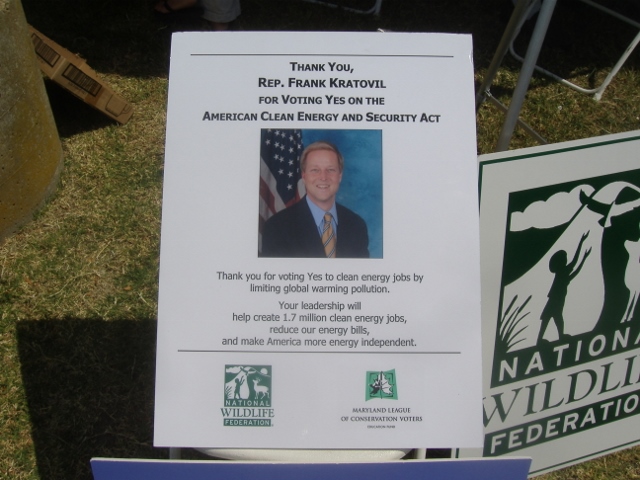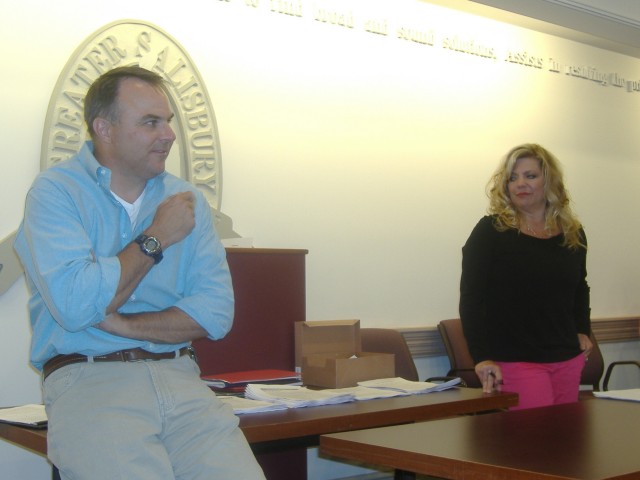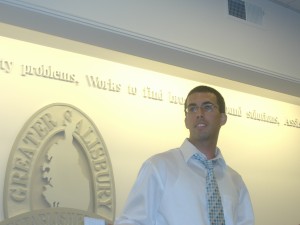As I mentioned yesterday I got Congressman Frank Kratovil’s response to my phone call urging him to vote no on “cap and tax”. It will make for a long post but I’m going to refute a number of points he made and try to predict his excuse for voting to nationalize health care while I’m at it. While he may have signed the “Blue Dog” letter that only committed him to voting against the bill as it was and we have no idea what 300-page amendment could be thrown in at the last second to appease him.
So here goes. Instead of blockquoting, his letter will be in italics.
Thank you for contacting my office to share your thoughts on H.R. 2454, the American Clean Energy and Security Act. There’s no question this is one of the most significant pieces of legislation that Congress will consider this year, and so I appreciate you taking the time to convey your opinion on this important issue.
Indeed, it is quite significant, so it’s disappointing that the bill was rushed through the House so quickly. Luckily the Senate has yet to take it up. Another significant piece of legislation will be health care “reform” (read: nationalization) and the Obama Administration is rushing that through full bore too.
Every year the United States spends hundreds of billions of dollars on foreign oil, with much of that money going to hostile or unfriendly governments. This addiction to foreign oil has put our energy security in the hands of dictators. Meanwhile, our dependence on fossil fuels has led to rising utility bills year after year and has blocked the development of innovative technologies needed to diversify our energy supply. Gas prices are fluctuating wildly, American manufacturers are falling behind the rest of the world, and big energy companies continue to post record profits at the expense of families and small businesses. It is clear that the status quo is not working.
The point is correct but you’re advocating the wrong solutions here. We spend hundreds of billions on foreign oil because the federal government, through regulations and restrictions on where drilling may take place, has made it more profitable for energy companies to go elsewhere for supply. Yet there is nothing blocking the development of innovative energy solutions except market forces which the government should stay away from. Nor should it be the concern of the federal government whether oil companies make record profits because those profits are plowed back into the business.
If you change a few words you could make this paragraph talk about health care too since certainly Frank thinks that status quo isn’t working either.
When I ran for Congress, I promised that among my top priorities would be reducing our nation’s dependence on foreign oil, reducing gas prices, increasing investments in domestic renewable energy, protecting the Chesapeake Bay, and fighting to get our farmers the resources needed to thrive on the Eastern Shore. In thoroughly reviewing the American Clean Energy and Security Act, it became clear to me that a vote against ACES would have been a betrayal of those promises. This bill offers a balanced, comprehensive plan for ending our reliance on foreign oil and spurring innovation, investment, and job creation here at home. Furthermore, numerous changes were made to the bill to specifically address the concerns of farmers, including an amendment I authored that will make Maryland farmers eligible for approximately $1 billion in incentives for environmentally sound practices. After years of struggling with the costs of the failed status quo, ACES gives us an opportunity to move in a new direction, and so I voted with a bipartisan majority to support passage of H.R. 2454.
This is why there’s such an outcry among conservatives like me about 8 Republicans voting for the bill – it provides that “bipartisan” fig leaf for Frank’s vote. Further, this is the second instance of citing a “failed” staus quo, one which really wasn’t failing. But the new direction he voted in favor of only leads to higher energy prices and more government – witness the $1 billion carrot to Maryland farmers for particular practices. If this were a truly “balanced” bill, though, it would have made things easier for oil and natural gas exploration and taken the restrictions off areas deemed untouchable by the federal government.
Similarly, Frank only says he’s against the health care bill as it was introduced. What remains to be seen is the incentive placed into that bill to curry his favor. Methinks it won’t take much.
I understand that ratepayers, small businesses, and farmers have a number of questions and concerns about the impact this legislation may have. Like you, my own family has been faced with rising energy costs over the past several years, and I share the concern of what additional costs would mean to families and businesses here in the First District. It’s important to remember that ACES will have a varied impact on different regions of the country based on the existing state laws and the current energy portfolio of those regions. For that reason, I thought it was important in reviewing the bill to set aside the national rhetoric and the partisan talking points to look objectively at the impact that the bill will have here in Maryland.
This is key to his argument, as he talks in the next several paragraphs about Maryland’s state restrictions being stricter than the proposed federal law. But two wrongs do not make a right.
As is often the case, legitimate arguments against his position are reduced to “partisan talking points”. Similarly, the onerous federal requirements for health insurance which will eventually force people into a government insurance program is just a “talking point”.
Opponents of a cap-and-trade regulatory system need to remember that we already have cap-and-trade here in Maryland. Maryland has been part of a regional cap-and-trade initiative since 2007, which has generated tens of millions of dollars in revenue to the state to fund consumer rebates and energy conservation programs. In fact, Maryland’s greenhouse gas emissions reduction goal – a 25% reduction by 2020 – is already tougher than the 17% reduction goal called for in ACES. For this and other reasons, any rate impacts in Maryland will be considerably less than the impacts in other regions of the country. The non-partisan Congressional Budget Office has projected that nationwide, the American Clean Energy and Security Act will increase costs for the average family by about $15 per month before efficiency savings are factored in. However, here in Maryland, another study projects that the ACES bill will actually save families $8 per month when efficiency savings and state-specific factors are considered.
I don’t know which study Frank cites regarding the $8 per month savings, but I can tell you the CBO study’s key flaw is that it doesn’t take into account the massive GDP loss and its effect on the mythical “average” family.
Moreover, Maryland has high electrical rates because the utilities need to recoup their costs from the Regional Greenhouse Gas Initiative. The state uses much of its RGGI proceeds to assist low-income families with weatherizing their homes and defraying their utility costs – in essence, a transfer of capital which keeps a select few bureaucrats in Annapolis busy but raises costs for the rest of us. Now imagine this program times 50 because similar measures are included within Waxman-Markey.
Trust me, some wealth transfer program will be included in the health care provisions. There’s already reports of hammering the “rich” with yet another tax to pay for health care and certainly Frank will be drooling at the chance to soak them once again.
I know that there are many nightmare scenarios being thrown around regarding the costs of this legislation. I’ve heard the claims that this bill is a massive energy tax, or that it could increase costs for families by thousands of dollars a year, or that it would require homeowners to make expensive upgrades and pay for an energy audit before being allowed to sell their homes. To be blunt, these claims are simply not true. The American Clean Energy and Security Act does not increase taxes whatsoever. It does not require any sort of energy audit for existing homes, and the efficiency standards included in the bill apply only to new construction. Furthermore, the claims about the costs to families and small businesses are simply unfounded. The ACES legislation sets aside hundreds of billions of dollars worth of free emissions allowances to allow utility companies to provide direct rebates and cost reductions to customers. Tens of billions of dollars more will be directed to provide additional savings for low- and moderate-income families. Given these unprecedented cost-saving measures, and the fact that Maryland is already ahead of the curve on the deployment of clean energy technologies, it is projected that the bill may end up saving Maryland ratepayers on a monthly basis.
While the bill doesn’t overtly raise taxes, it acts the same as a tax because expenditures for the average household increase. And while Frank is technically right about not requiring an energy audit for existing homes, Section 204 of the bill spells out conditions where labeling would be required:
In adopting the model labeling program established under this section, a State shall seek to ensure that labeled information be made accessible to the public in a manner so that owners, lenders, tenants, occupants, or other relevant parties can utilize it. Such accessibility may be accomplished through–
(A) preparation, and public disclosure of the label through filing with tax and title records at the time of–
(i) a building audit conducted with support from Federal or State funds;
(ii) a building energy-efficiency retrofit conducted in response to such an audit;
(iii) a final inspection of major renovations or additions made to a building in accordance with a building permit issued by a local government entity;
(iv) a sale that is recorded for title and tax purposes consistent with paragraph (8);
(v) a new lien recorded on the property for more than a set percentage of the assessed value of the property, if that lien reflects public financial assistance for energy-related improvements to that building; or
(vi) a change in ownership or operation of the building for purposes of utility billing; or
(B) other appropriate means.
Basically, those who have energy-inefficient houses which would require more than they’re worth to comply are stuck. And it sounds like an energy audit requirement to me. The rest of the paragraph simply dictates the wealth transfer I spoke of earlier.
The next several paragraphs demonstrate where Frank was bought off to vote for the Waxman-Markey bill.
In addition to the concerns of ratepayers and small businesses, another major factor I considered in reviewing this bill was the impact it would have on Maryland’s farmers. It is important to point out that farmers will not have their emissions regulated by this bill, and will be completely exempted from the emissions caps. Furthermore, as a member of the House Agriculture Committee, I worked closely with Chairman Collin Peterson to address many of the concerns the agricultural community had raised about earlier drafts of H.R. 2454. Thanks to our efforts, a number of amendments were made to the final bill to make it a better deal for farmers, including:
The bill’s agricultural and forestry offset program will be run by U.S. Department of Agriculture, instead of by the Environmental Protection Agency. Chairman Peterson successfully argued that the USDA better understands the economics of farming and is therefore more likely to provide the flexibility farmers need to benefit from these programs.
A portion of the emission allowances will be provided for free to the nation’s rural electrical cooperatives, like the Choptank Electrical Cooperative on the Eastern Shore, which will enable these co-ops to provide direct rate relief to rural customers.
The definition of “biomass” in the bill was adjusted to give agricultural and forestry entities a greater ability to participate in the offset programs and receive valuable offset credits.
Even with these changes to the bill, I only decided to support ACES after its authors accepted an amendment I offered that set aside an additional $1 billion of emissions allowances for farmers, like many in Maryland, who would otherwise be prohibited from receiving credit for their environmental practices. This amendment, along with the increased demand for biofuels that will result from this bill, will open up considerable new revenue streams for Maryland farmers.
Collectively, these changes to the bill enjoyed broad support from the agricultural community and were endorsed by organizations including the American Corn Growers Association, the American Farmland Trust, the American Farm Bureau Association, the American Soybean Association, Dairy Farmers of America, the National Association of Conservation Districts, the National Association of Wheat Growers, the National Biodiesel Board, the National Cattlemen’s Beef Association, the National Corn Growers Association, the National Cotton Council, the National Council of Farmer Cooperatives, the National Farmers Union, the National Milk Producers Federation, the National Pork Producers Council, and the United Egg Producers.
While I understand that some of these organizations continued to oppose final passage of the bill even after the inclusion of the supported amendments, it is important to remember that the costs to farmers, small businesses, and family ratepayers will likely be far greater if Congress fails to act. The U.S. Supreme Court has already confirmed the EPA’s authority and obligation to proceed with its own regulatory program if Congress fails to act, an option that would wipe out all of the concessions and amendments secured for ratepayers and farmers.
It’s also noteworthy that many agricultural groups still were against Waxman-Markey even with their concerns addressed. They understood better than Frank did the negative impacts this will have on the family farm. Perhaps the corporate farm will thrive but the additional regulations sure to come will be a deeper headache for those farmers on the Shore.
I wonder how many providers Frank will listen to when he votes to nationalize health care?
By breaking our reliance on foreign oil and creating real incentives for American businesses, entrepreneurs, and farmers, the American Clean Energy and Security Act presents an incredible opportunity to spur innovation and create new green jobs. In 2007, Maryland already had 1,145 businesses working in the clean energy sector, which collectively generated more than 12,900 green jobs and attracted nearly $324 million in private investment capital. Right here in the First District, there are already a number of small businesses who are poised to reap the benefits of this bill, from solar equipment dealers and installers to geothermal energy contractors and wind power consultants. Additional entrepreneurs will also now have incentives to enter the market, creating private jobs and new economic opportunities. It is estimated that the American Clean Energy and Security Act and the American Recovery and Reinvestment Act could generate roughly $150 billion in clean energy investments each year for the next decade, creating as many as 1.7 million jobs nationally and 26,600 here in Maryland.
All this is pure speculation, and given the track record lately of federal government predictions I predict net job losses as manufacturers and providers of “traditional” energy sources send jobs overseas to avoid the tolls placed by H.R. 2454. Government “incentives” last only as long as Fedzilla wants them to and there are ALWAYS strings attached, so buyer beware.
What “incentives” will there be for businesses to keep private health insurance when the government (who doesn’t have to make a profit) steps in?
When it comes to our nation’s energy policy, the status quo is simply not working. We can no longer afford to ship hundreds of billions of dollars overseas each year, while leaving our economic and national security in the hands of dictators. The American Clean Energy and Security Act will finally move us in a new direction by spurring investment in clean, homegrown technologies like wind, solar, and biofuels, while taking extraordinary steps to protect ratepayers and famers. After thoroughly reviewing the bill and listening to the concerns and questions of constituents on both sides of the debate, I believe that the American Clean Energy and Security Act is a balanced, thoughtful approach to ending our reliance on foreign oil and investing in America’s clean energy future.
Again, the straw man of the “status quo” is placed in play here. ACES is not “balanced” and, with 300 pages placed into the bill late in the process, I’m dubious on the “thoughtful” part as well.
Please do not hesitate to contact me again in the future regarding issues that concern you. I also encourage you to visit my website in order to stay informed on the issues I’m working on in Congress. I believe that continuous communication with the residents of the First District is essential to helping me be an effective advocate for you in Congress, and I thank you again for taking the time to chare (sic) your thoughts with me.
P.S. I’ve been hearing from a number of constituents who are very concerned by some of the myths circulating about the American Clean Energy and Security Act. Let me be very direct: This bill does not increase taxes, it does not add to the federal deficit, and it does not require a home energy audit before you can sell your home. These claims are simply false.
In order to help you separate the myths from the facts, I have enclosed a short document that outlines some of the misconceptions about the bill. I hope this helps you better understand the truth about this important legislation, and I encourage you to share this information with friends or neighbors who are similarly concerned by the incorrect information being circulated about this bill.
That has many of the same arguments as the remainder of the letter.
Frank M. Kratovil, Jr.
Member of Congress
Not after 2010 if I can help it. We can do MUCH better.
We will probably go through the same charade on the health care bill, as I will contact Frank to urge his “no” vote and he’ll bow to the special interests who are writing the bill and say “yes” anyway. I give that a 90% chance of occurring.
There is always the law of unintended consequences to contend with whenever government tries to solve a problem the free market has a pretty good handle on. Those lead to yet more government intervention in order to create a “fix” for the problems begat by the original law.
Having gas prices shoot up to $4.00 a gallon made everyone good and mad at the oil companies and may have provided some additional impetus for this legislation. But you’ll notice gas prices went down about as quickly as they went up because the market corrected itself.
If the government and overzealous regulators got out of the markets for electricity, natural gas, and other energy sources we may find that prices will fluctuate but eventually return to true value. (This is why we have to have subsidies for certain energy sources and methods – the price point is otherwise unmarketable.)
Unfortunately that same “fix” Waxman-Markey creates in the energy field will be coming soon to health care – unless we stop it now. I only give Frank a 10% chance of voting the right way (as opposed to nil for our Senators) so it’s a chance we’ll have to take, at least until we can correct things in the next election.













